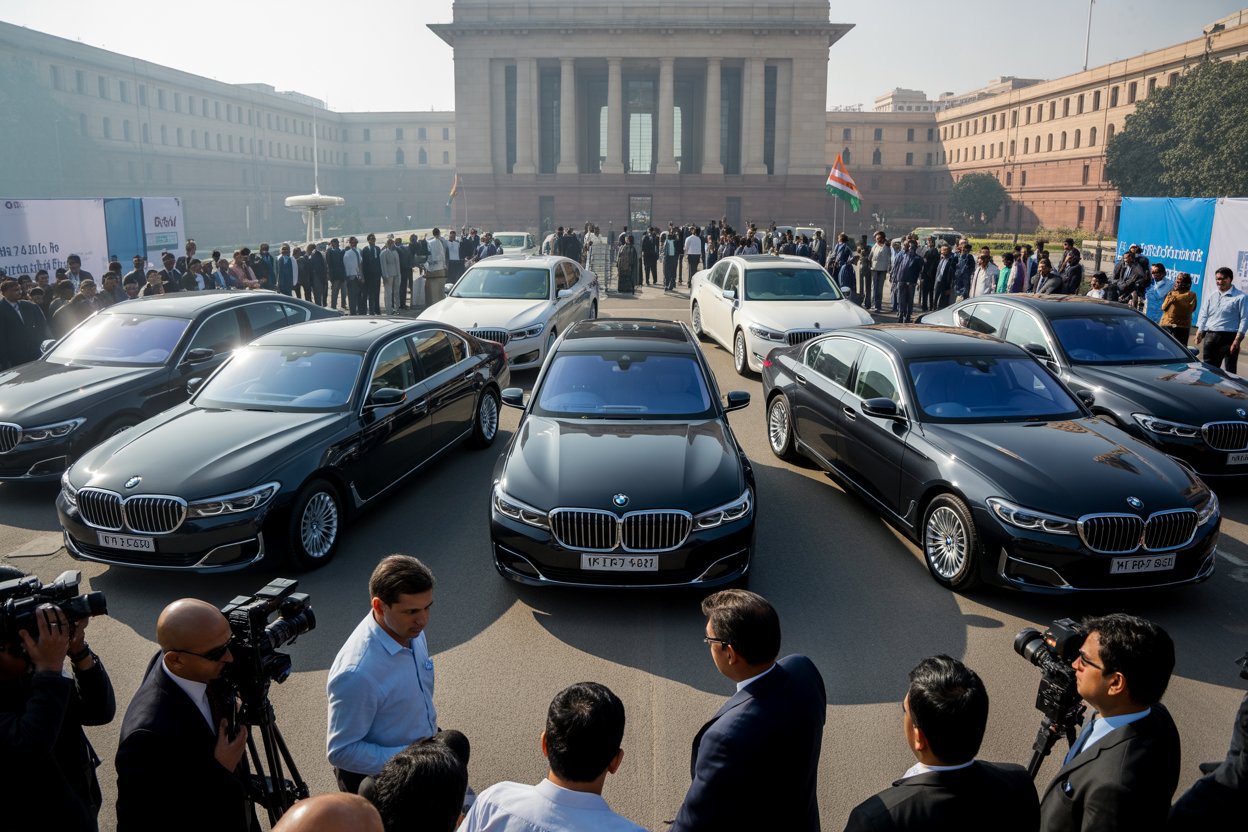

Lokpal BMW Cars Tender: Inside the Controversy Over Luxury Car Procurement
The recent Lokpal BMW cars tender has sparked intense public debate and political reactions across India. Within days of the announcement, social media and opposition leaders raised questions about the need for such luxury vehicles for an anti-corruption body meant to symbolize integrity.
In simple terms, the Lokpal BMW cars tender refers to a public procurement process floated by the Lokpal of India to purchase seven BMW vehicles for official use. Critics argue that the move contradicts the very essence of transparency and simplicity expected from an institution combating corruption. Meanwhile, supporters claim it’s a legitimate administrative decision ensuring operational efficiency and safety.
Breaks down every detail — from the tender’s background to the reactions it has received — providing you a full picture of the Lokpal BMW cars tender and its implications.
Background: What Is the Lokpal BMW Cars Tender?
The Lokpal BMW cars tender was issued by the seven-member Lokpal bench, inviting bids for luxury sedans from BMW India. The tender raised eyebrows as it appeared inconsistent with the anti-corruption body’s image of ethical restraint.
The Lokpal floats tender for BMW cars to replace its existing vehicle fleet, reportedly citing the need for enhanced comfort and security. According to official reports, these cars were to be assigned to senior members of the Lokpal, including the Chairperson and other officials.
Key Highlights of the Tender:
| Specification | Details |
|---|---|
| Vehicle Brand | BMW (Luxury Sedan Models) |
| Quantity | 7 Cars |
| Estimated Cost | ₹1.7 Crore per Unit |
| Purpose | Official use by Lokpal members |
| Tender Issued | October 2025 |
| Tender Type | Public Procurement under Central Government Norms |
For comparison, you can explore more about affordable EVs like the Sundak Mini Electric Car 2025, which represent India’s growing focus on budget mobility.
Why It Became Controversial
The Lokpal BMW order row began when media outlets like The Indian Express and India Today reported that even Supreme Court judges use modest sedans, questioning the need for premium BMWs. Former finance minister P. Chidambaram criticized the decision, stating that such a move might erode public trust.
The Lokpal BMW cars firm reportedly defended the procurement as being in line with government policy, but the optics of luxury purchases by an anti-corruption agency fueled a massive debate online.
For instance, news about celebrity purchases such as Samay Raina’s new car tend to generate buzz, but when such purchases come from a government body meant to ensure transparency, scrutiny naturally intensifies.
The Justification from Lokpal Officials
Officials clarified that the Lokpal BMW cars tender followed standard procedures under the Government e-Marketplace (GeM) and was aimed at ensuring safe, reliable vehicles for official duties.
They emphasized:
- Security protocols require high-end vehicles with advanced safety features.
- Operational efficiency demands robust vehicles for travel across India.
- Transparency in the tender process was maintained.
The Lokpal BMW tender thus may not technically violate procurement norms — but it raised ethical and symbolic questions.
Public and Political Reactions
The Lokpal BMW bid quickly became a trending topic. Opposition leaders questioned whether luxury was compatible with the Lokpal’s mission.
Social media was flooded with memes, and hashtags like #LokpalBMW and #IntegrityOrLuxury went viral.
Interestingly, many drew parallels to luxury cars owned by private individuals and communities, similar to the stories featured in Jain Luxury Cars: How the Jain Community Saved ₹21.5 Crore.
Expert Opinions: Ethics vs. Efficiency
Experts are divided. Some believe that public perception matters more than administrative justification. Others argue that expecting senior officials to use outdated or unsafe cars isn’t practical.
Pros and Cons of the Lokpal BMW Cars Tender
| Pros | Cons |
|---|---|
| Improved safety and comfort for officials | Sends the wrong message to the public |
| Government-approved procurement process | Luxury image contradicts Lokpal’s purpose |
| Transparent tendering via GeM | Possible misuse of taxpayer sentiment |
Automotive experts point out that luxury vehicles like BMW sedans are known for durability and reliability, making them long-term assets. Still, when compared to affordable options like the Maruti Swift 2025 Hatchback, the expenditure gap is striking.
Comparing Luxury and Practical Government Purchases
Government departments worldwide often procure vehicles for official use. However, the Lokpal BMW order stands out because the agency’s core function is fighting corruption.
| Country | Agency | Official Car Type | Price Range |
|---|---|---|---|
| India | Lokpal | BMW 5-Series (Proposed) | ₹1.7 Cr |
| UK | Serious Fraud Office | Audi A6 | ₹75 Lakh |
| US | Department of Justice | Ford SUVs | ₹60 Lakh |
| Japan | Public Prosecutor’s Office | Toyota Crown | ₹55 Lakh |
This chart demonstrates that India’s proposed Lokpal BMW bid is significantly higher than similar international agencies.
Financial Implications
The Lokpal bid for seven BMWs is estimated to cost over ₹12 crore. Critics argue this budget could have been allocated to strengthen investigative teams or fund whistleblower protection.
For perspective, citizens can explore value-for-money vehicles like Cars Under 5 Lakh that highlight affordability and practicality—something taxpayers often expect from government spending.
Symbolism and Public Perception
The Lokpal institution was created to represent integrity, austerity, and justice. The Lokpal BMW cars tender may fulfill administrative needs, but its symbolism risks undermining the body’s moral authority.
Public perception, especially in India, often values simplicity in public service. When an anti-corruption agency opts for luxury, it invites skepticism, no matter how transparent the tender is.
Broader Impact on Governance and Trust
A government body’s choices reflect its values. The Lokpal BMW cars tender debate has revived discussions about the ethics of expenditure in public offices.
The public expects the Lokpal to set examples of restraint — much like how manufacturers like Eko Tejas Electric Scooter promote sustainability over extravagance.
Public Sentiment Analysis (Chart)
| Sentiment Type | Percentage | Reaction Summary |
|---|---|---|
| Negative | 68% | Criticism on social media |
| Neutral | 20% | Wait-and-watch approach |
| Supportive | 12% | Backing for efficiency and safety |
Public perception leans heavily negative, showing that symbolism outweighs administrative reasoning for most citizens.
Lessons for Public Institutions
The Lokpal BMW cars tender teaches several lessons:
-
Transparency isn’t enough — perception matters.
-
Public funds must align with moral expectations.
-
Institutions must communicate the “why” behind every decision.
Even for private brands like Royal Enfield Hunter 350, marketing relies on perceived integrity — similarly, the Lokpal’s credibility depends on public confidence.
Future Outlook
The controversy might push policymakers to redefine official purchase norms for independent institutions.
If the Lokpal BMW cars firm proceeds with the order, it may include stricter transparency reports and justifications in the public domain.
Conclusion
The Lokpal BMW cars tender is a lesson in how perception, ethics, and symbolism matter just as much as legality. While the procurement might follow due process, its moral impact has been profound. Transparency must extend beyond paperwork — it must resonate with the spirit of accountability.
For readers interested in how design and innovation meet practicality in the auto world, check out the latest Vellfire Car Price insights for comparison.
1. What is the Lokpal BMW cars tender?
It’s a public procurement initiative to purchase seven BMW vehicles for the Lokpal of India’s official use.
2. Why is the Lokpal BMW cars tender controversial?
Because many view luxury car purchases by an anti-corruption body as hypocritical.
3. Was the Lokpal BMW order transparent?
Yes, it followed GeM procurement norms but raised ethical questions.
4. What is the cost of each BMW car?
Around ₹1.7 crore per unit.
5. Which BMW models were proposed?
Likely BMW 5-Series or equivalent luxury sedans.
6. How does this compare to other government agencies?
Most use mid-range or economy cars, making this tender stand out.
7. Will the Lokpal cancel the tender?
There’s no confirmation yet, but political pressure may influence the outcome.
8. What’s the public opinion on the Lokpal BMW order row?
The majority of the public perceives it negatively, seeing it as a misuse of image and intent.
Add a comment Cancel reply
Comments (0)
Most Expensive Cars in the World 2025 – Top 10 Luxury Hypercars & Prices
[…] even premium brands like Lokpal BMW Cars Tender and Jain Luxury Cars Story show how diverse India’s automobile sector has become — from Rs. 5 […]
Lokpal BMW Cars Tender: Luxury Bid Sparks Public Outrage
[…] eco-conscious buyers simultaneously. Tata’s move could shake up the market similar to the recent lokpal BMW cars tender news that caught nationwide […]
Categories
- Article (214)
- Bike News (87)
- Bike Reviews (30)
- Car News (188)
- Car Reviews (14)
Recent Posts
About us

Related posts


Skoda Kushaq Facelift 2026 : Complete Breakdown of Changes, Features, Misses and Buyer Insights


Mahindra XUV 7XO, XEV 9S Record Massive Bookings Worth ₹20,500 Crore


Volkswagen 7 Seater SUV Coming to India : Tayron Details, Design, Launch Timeline and Full Information









